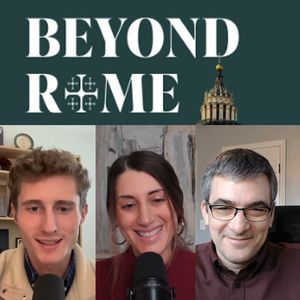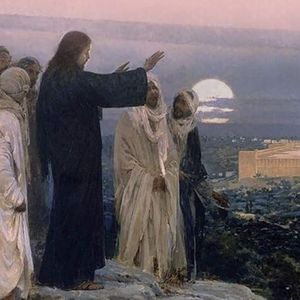


"For I do not desire, brethren, that you should be ignorant of this mystery... that blindness in part has happened to Israel until the fullness of the Gentiles has come in. And so all Israel will be saved... Concerning the gospel they are enemies for your sake, but concerning the election they are beloved for the sake of the fathers. For the gifts and the calling of God are irrevocable." (Rom 11:25-29)
Articles on the relationship between Israel and the Church, and role of Israel in God's plan of salvation.
 Dr. André Villeneuve addresses the problem of Catholic anti-Zionism—including 15 fallacies upon which it is based—and its underlying cause: the enduring influence of Catholic supersessionism.
Dr. André Villeneuve addresses the problem of Catholic anti-Zionism—including 15 fallacies upon which it is based—and its underlying cause: the enduring influence of Catholic supersessionism.
 Dr. André Villeneuve and Dr. Matthew Tsakanikas debate the question of Catholic Zionism in light of Sacred Scripture, Catholic Tradition, and the teachings of the Magisterium.
Dr. André Villeneuve and Dr. Matthew Tsakanikas debate the question of Catholic Zionism in light of Sacred Scripture, Catholic Tradition, and the teachings of the Magisterium.
 Since the October 7 Hamas attack against Israel, a troubling surge in global antisemitism has emerged—including within Catholic circles. A case in point is LifeSiteNews, given its track record of publishing anti-Israel narratives. Does LifeSiteNews have an antisemitism problem? Let's take a closer look.
Since the October 7 Hamas attack against Israel, a troubling surge in global antisemitism has emerged—including within Catholic circles. A case in point is LifeSiteNews, given its track record of publishing anti-Israel narratives. Does LifeSiteNews have an antisemitism problem? Let's take a closer look.
 On the Beyond Rome podcast, Simone Rizkallah and James O’Reilly are joined by Andre Villeneuve to discuss how Catholics should navigate between the two heresies of Supersessionism (or Replacement Theology) and Dual Covenant Theology.
On the Beyond Rome podcast, Simone Rizkallah and James O’Reilly are joined by Andre Villeneuve to discuss how Catholics should navigate between the two heresies of Supersessionism (or Replacement Theology) and Dual Covenant Theology.
 The central fact, which has its deepest meaning for the philosophy of history and for human destiny—and which no one seems to take into account—is that the passion of Israel today is taking on more and more distinctly the form of the Cross.
The central fact, which has its deepest meaning for the philosophy of history and for human destiny—and which no one seems to take into account—is that the passion of Israel today is taking on more and more distinctly the form of the Cross.
 The horrific Hamas attacks on Israel on October 7, 2023 and the ensuing war in Gaza have raised many questions among Catholics: Should they support Israel? Does modern Israel still benefit from any kind of special status today as God’s chosen nation, or should we view it as a purely secular political entity like every other state? This article will consider these questions and seek to provide some basic theological and catechetical principles and guidelines for Catholics concerning the “mystery of Israel.”
The horrific Hamas attacks on Israel on October 7, 2023 and the ensuing war in Gaza have raised many questions among Catholics: Should they support Israel? Does modern Israel still benefit from any kind of special status today as God’s chosen nation, or should we view it as a purely secular political entity like every other state? This article will consider these questions and seek to provide some basic theological and catechetical principles and guidelines for Catholics concerning the “mystery of Israel.”
 The unconditional gift of the election of the Jewish people is the theological foundation of Catholic Zionism. Many New Testament texts support the notion that Catholics should endorse Zionism. Jesus himself was a Jewish Christian Zionist. Catholics accept that the Jewish people still have a providential role to play, and their return to the land of Israel may be part of the still-to-be-completed redemptive plan.
The unconditional gift of the election of the Jewish people is the theological foundation of Catholic Zionism. Many New Testament texts support the notion that Catholics should endorse Zionism. Jesus himself was a Jewish Christian Zionist. Catholics accept that the Jewish people still have a providential role to play, and their return to the land of Israel may be part of the still-to-be-completed redemptive plan.
 Critics of Christian Zionism usually dismiss it for one of three reasons: (1) They say it contradicts the New Testament, which replaces the Old Testament focus on a particular land by the vision of a whole world; (2) They think it is the exclusive concern of premillennial dispensationalists; (3) It is said to be more political than theological, attached to right-wing American and Israeli political parties that wrongly identify the current Israeli state with the eschaton. Scholars recently made the case for a "new" Christian Zionism that takes a fresh approach to all three of these problems.
Critics of Christian Zionism usually dismiss it for one of three reasons: (1) They say it contradicts the New Testament, which replaces the Old Testament focus on a particular land by the vision of a whole world; (2) They think it is the exclusive concern of premillennial dispensationalists; (3) It is said to be more political than theological, attached to right-wing American and Israeli political parties that wrongly identify the current Israeli state with the eschaton. Scholars recently made the case for a "new" Christian Zionism that takes a fresh approach to all three of these problems.
 Gerald McDermott explores the notion of supersessionism in Christian theology, which suggests the promises made to the Jewish people in the Old Testament, including the land promise, have been superseded by the Christian church. This view has dominated Christian interpretation since the fourth century, leading to the marginalization of the New Testament's references to the land promise. Evidence in the New Testament contradicts supersessionism, and recognizing the ongoing significance of the land promise is vital for understanding God's trustworthiness and the fulfillment of his promises.
Gerald McDermott explores the notion of supersessionism in Christian theology, which suggests the promises made to the Jewish people in the Old Testament, including the land promise, have been superseded by the Christian church. This view has dominated Christian interpretation since the fourth century, leading to the marginalization of the New Testament's references to the land promise. Evidence in the New Testament contradicts supersessionism, and recognizing the ongoing significance of the land promise is vital for understanding God's trustworthiness and the fulfillment of his promises.
 Dr. André Villeneuve discusses the role of Israel in the age of the Church on Michael Lofton's "Reason and Theology" podcast. Topics include God's covenant with Israel, supersessionism, the idea of the Church as "new Israel", Israel's role in the age of the Church, the modern state of Israel, Zionism, the Israeli-Palestinian conflict, and Israel's role in regard to Jesus' Second Coming.
Dr. André Villeneuve discusses the role of Israel in the age of the Church on Michael Lofton's "Reason and Theology" podcast. Topics include God's covenant with Israel, supersessionism, the idea of the Church as "new Israel", Israel's role in the age of the Church, the modern state of Israel, Zionism, the Israeli-Palestinian conflict, and Israel's role in regard to Jesus' Second Coming.

According to Luke-Acts, Jerusalem possesses a unique status not only because "the kingdom of Christ" is "historically anchored" there, but even more because that kingdom will achieve its eschatological consummation within its walls.